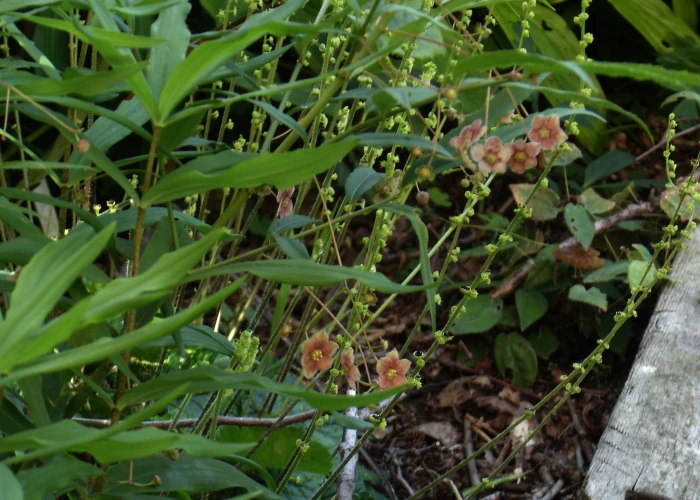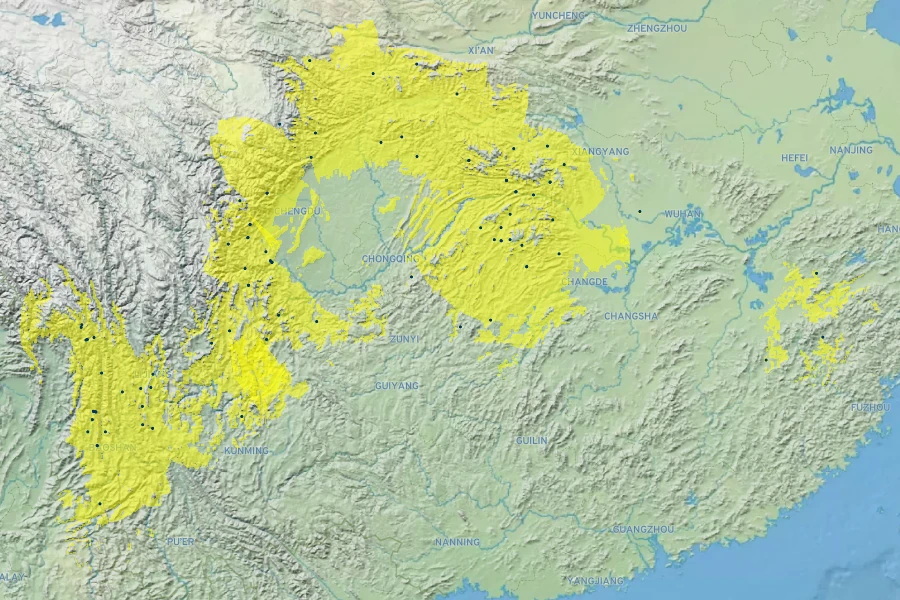Five-Horned Spindle
/
(Euonymus cornutus)
Five-Horned Spindle (Euonymus cornutus)
/

peganum
CC BY-SA 2.0
Image By:
peganum
Recorded By:
Copyright:
CC BY-SA 2.0
Copyright Notice:
Photo by: peganum | License Type: CC BY-SA 2.0 | License URL: https://creativecommons.org/licenses/by-sa/2.0/ | Uploader: peganum | Publisher: Flickr |










Summary
Euonymus cornutus, commonly known as Five-Horned Spindle, is a deciduous or semi-deciduous shrub native to forest margins, scrublands, and open woodlands in Central China and the Himalayas. It typically grows to a height of 7-9 feet (2.1-2.7 meters) and a width of 4-6 feet (1.2-1.8 meters). The Five-Horned Spindle is notable for its unique horn-shaped seed capsules and its small, inconspicuous greenish-purple flowers that appear in late spring to early summer. The foliage is medium green and may turn yellow in the fall, adding seasonal interest.
This shrub is valued for its distinctive seed capsules that provide ornamental interest, particularly in the fall and winter when they persist on the plant. It is used in cultivation for border planting, as a specimen in gardens, and sometimes for naturalizing in informal settings. Euonymus cornutus prefers full sun to part shade and adapts to a range of soil types, though it thrives in well-drained soils. It requires medium to high amounts of water, especially during dry periods. While generally easy to maintain, it can be susceptible to euonymus scale and other pests. Gardeners should monitor for infestations and manage them promptly to prevent damage.CC BY-SA 4.0
This shrub is valued for its distinctive seed capsules that provide ornamental interest, particularly in the fall and winter when they persist on the plant. It is used in cultivation for border planting, as a specimen in gardens, and sometimes for naturalizing in informal settings. Euonymus cornutus prefers full sun to part shade and adapts to a range of soil types, though it thrives in well-drained soils. It requires medium to high amounts of water, especially during dry periods. While generally easy to maintain, it can be susceptible to euonymus scale and other pests. Gardeners should monitor for infestations and manage them promptly to prevent damage.CC BY-SA 4.0
Plant Description
- Plant Type: Shrub
- Height: 7-9 feet
- Width: 4-6 feet
- Growth Rate: Moderate
- Flower Color: Green, Purple
- Flowering Season: Spring, Summer
- Leaf Retention: Deciduous, Semi-deciduous
Growth Requirements
- Sun: Full Sun, Part Shade
- Drainage: Medium
Common Uses
Bee Garden, Bird Garden, Low Maintenance, Rabbit Resistant, Showy Flowers
Natural Habitat
Forest margins, scrublands, and open woodlands in Central China and the Himalayas
Other Names
Common Names:
Scientific Names: Euonymus cornutus, Euonymus cornutus var. quinquecornutus, Euonymus cornutoides, Euonymus frigidus var. cornutoides, Euonymus cornutus subsp. quinquecornutus, Euonymus quinquecornutus
GBIF Accepted Name: Euonymus cornutus Hemsl.
